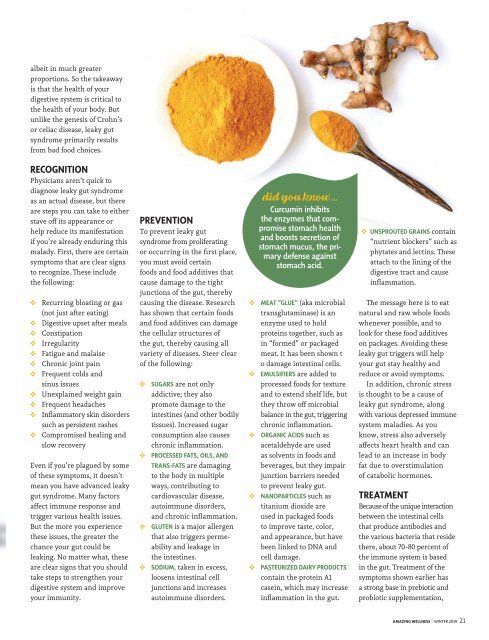Create successful ePaper yourself
Turn your PDF publications into a flip-book with our unique Google optimized e-Paper software.
albeit in much greater<br />
proportions. So the takeaway<br />
is that the health of your<br />
digestive system is critical to<br />
the health of your body. But<br />
unlike the genesis of Crohn’s<br />
or celiac disease, leaky gut<br />
syndrome primarily results<br />
from bad food choices.<br />
RECOGNITION<br />
Physicians aren’t quick to<br />
diagnose leaky gut syndrome<br />
as an actual disease, but there<br />
are steps you can take to either<br />
stave off its appearance or<br />
help reduce its manifestation<br />
if you’re already enduring this<br />
malady. First, there are certain<br />
symptoms that are clear signs<br />
to recognize. These include<br />
the following:<br />
Recurring bloating or gas<br />
(not just after eating)<br />
Digestive upset after meals<br />
Constipation<br />
Irregularity<br />
Fatigue and malaise<br />
Chronic joint pain<br />
Frequent colds and<br />
sinus issues<br />
Unexplained weight gain<br />
Frequent headaches<br />
Inflammatory skin disorders<br />
such as persistent rashes<br />
Compromised healing and<br />
slow recovery<br />
Even if you’re plagued by some<br />
of these symptoms, it doesn’t<br />
mean you have advanced leaky<br />
gut syndrome. Many factors<br />
affect immune response and<br />
trigger various health issues.<br />
But the more you experience<br />
these issues, the greater the<br />
chance your gut could be<br />
leaking. No matter what, these<br />
are clear signs that you should<br />
take steps to strengthen your<br />
digestive system and improve<br />
your immunity.<br />
PREVENTION<br />
To prevent leaky gut<br />
syndrome from proliferating<br />
or occurring in the first place,<br />
you must avoid certain<br />
foods and food additives that<br />
cause damage to the tight<br />
junctions of the gut, thereby<br />
causing the disease. Research<br />
has shown that certain foods<br />
and food additives can damage<br />
the cellular structures of<br />
the gut, thereby causing all<br />
variety of diseases. Steer clear<br />
of the following:<br />
<br />
<br />
<br />
<br />
SUGARS are not only<br />
addictive; they also<br />
promote damage to the<br />
intestines (and other bodily<br />
tissues). Increased sugar<br />
consumption also causes<br />
chronic inflammation.<br />
PROCESSED FATS, OILS, AND<br />
TRANS-FATS are damaging<br />
to the body in multiple<br />
ways, contributing to<br />
cardiovascular disease,<br />
autoimmune disorders,<br />
and chronic inflammation.<br />
GLUTEN is a major allergen<br />
that also triggers permeability<br />
and leakage in<br />
the intestines.<br />
SODIUM, taken in excess,<br />
loosens intestinal cell<br />
junctions and increases<br />
autoimmune disorders.<br />
<br />
<br />
<br />
<br />
<br />
did you know...<br />
Curcumin inhibits<br />
the enzymes that compromise<br />
stomach health<br />
and boosts secretion of<br />
stomach mucus, the primary<br />
defense against<br />
stomach acid.<br />
MEAT “GLUE” (aka microbial<br />
transglutaminase) is an<br />
enzyme used to hold<br />
proteins together, such as<br />
in “formed” or packaged<br />
meat. It has been shown t<br />
o damage intestinal cells.<br />
EMULSIFIERS are added to<br />
processed foods for texture<br />
and to extend shelf life, but<br />
they throw off microbial<br />
balance in the gut, triggering<br />
chronic inflammation.<br />
ORGANIC ACIDS such as<br />
acetaldehyde are used<br />
as solvents in foods and<br />
beverages, but they impair<br />
junction barriers needed<br />
to prevent leaky gut.<br />
NANOPARTICLES such as<br />
titanium dioxide are<br />
used in packaged foods<br />
to improve taste, color,<br />
and appearance, but have<br />
been linked to DNA and<br />
cell damage.<br />
PASTEURIZED DAIRY PRODUCTS<br />
contain the protein A1<br />
casein, which may increase<br />
inflammation in the gut.<br />
UNSPROUTED GRAINS contain<br />
“nutrient blockers” such as<br />
phytates and lectins. These<br />
attach to the lining of the<br />
digestive tract and cause<br />
inflammation.<br />
The message here is to eat<br />
natural and raw whole foods<br />
whenever possible, and to<br />
look for these food additives<br />
on packages. Avoiding these<br />
leaky gut triggers will help<br />
your gut stay healthy and<br />
reduce or avoid symptoms.<br />
In addition, chronic stress<br />
is thought to be a cause of<br />
leaky gut syndrome, along<br />
with various depressed immune<br />
system maladies. As you<br />
know, stress also adversely<br />
affects heart health and can<br />
lead to an increase in body<br />
fat due to overstimulation<br />
of catabolic hormones.<br />
TREATMENT<br />
Because of the unique interaction<br />
between the intestinal cells<br />
that produce antibodies and<br />
the various bacteria that reside<br />
there, about 70-80 percent of<br />
the immune system is based<br />
in the gut. Treatment of the<br />
symptoms shown earlier has<br />
a strong base in prebiotic and<br />
probiotic supplementation,<br />
AMAZING WELLNESS | WINTER <strong>2019</strong> 21

















